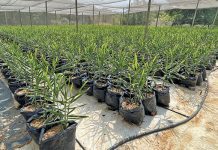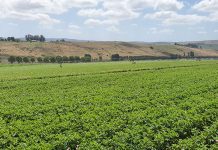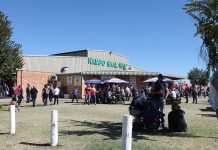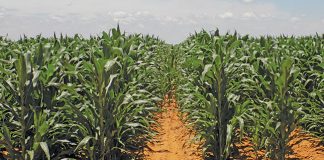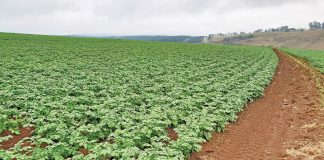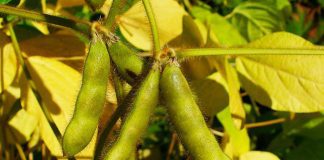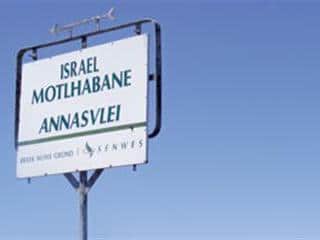
Israel Motlhabane bought Annasvlei, a farm of 568ha, at an auction in Wesselsbron in 1996. He could scarcely believe it when he won the bid and wondered what he had let himself in for. “But I decided then and there that I would do everything possible to become a successful grain producer. I grew up on a farm in the Hoopstad district, where my father was a farm worker. I loved the land and dreamed of having my own farm one day. This dream started coming true the day I bought Annasvlei.”
Israel was a successful businessman with a long distance taxi company, a construction company and two funeral parlours before he started farming. He sold these businesses in the early 2000s to focus his attention on farming. The sale of his businesses also allowed him to put down a sizeable deposit, in addition to a Land Bank loan, to purchase the land. Annasvlei is about 15km from Wesselsbron on the Kommandodrif road.

Israel Motlhabane, Grain SA’s 2012 Developing Grain Producer of the Year, at the Grain Producer of the Year awards.
The soil on the farm is mainly deep sandy loam and the average annual rainfall is 450mm. The arable land covers 410ha and 158ha is used for grazing. In 2008, adding 328ha to his land base, Israel bought Uitkyk Farm (also near Wesselsbron), with financial support from the Department of Rural Development and Land Reform. There is 200ha of arable land on Uitkyk and the rest is used for grazing. Israel now has 610ha of arable land.
Start up
When he started out, Israel had a 1972 Landini 8500 tractor, two maize planters (LM and Massey Ferguson) and a Soilmaster wheat planter. “I had a plan, but not much knowledge. Without my five brothers, Jerry, Kganyama, Tsietsii, Pencil and Lentilile, I would not have survived that first season. They were all experienced farm workers, skilled in crop production and they pitched in to help me get the crop planted.
We worked day and night and planted 300ha to Sensako yellow maize that year. The yield was about 4t/ha. That harvest was the most beautiful thing I have ever seen, paid for in blood, sweat and tears,” he recalls. His fleet now consists of two John Deere tractors, three Massey Fergusons and one Fiat. He uses contractors for harvesting but transports his own crop to the silos.
Israel follows minimum till and cultivation practices. His lands were ripped in preparation for planting when Farmer’s Weekly visited him. He manages soil acidity by applying calcitic lime and Greentop 20 to his sandy loam soils to raise the soil pH .
Fertiliser programme
Omnia developed a comprehensive fertilisation programme for Israel based on the results of soil sampling analyses.
“We decided to fertilise with nitrogen this year to increase yields,” Omnia’s Aron Kole explains. “We plan to apply 46kg/ ha, followed by a 46kg/ ha top-dressing later in the season. We use liquid fertiliser from our liquid fertiliser plant in Wesselsbron. It makes economic sense to use the locally available product.”

Israel is proud of his workers and says they have played an integral part in his success. Here with him are Ondaba Bambiso (left), Petrus Radebe (second from right) and Lie Mokuane (right). At the back is Jonas Pholona.
Goose grass (Eleusine coracana) is the primary target of Israel’s weed management programme. This perennial species has an extensive root system that makes it difficult to control. “At planting we apply a triazine-based herbicide such as Terbuzin 600 in conjunction with Monsanto’s Guardian S,” explains Tinus Cornelissen, chemical advisor from Nulandis. “This is followed after six weeks or so by Harness and Terbuzin 600. Goose grass has become a problem as farmers no longer plough as deep as they used to in the past.”
Israel uses Pannar and Monsanto GM cultivars and plants at a density of 22 000 plants/ha. He plans to plant 500ha to maize; 360ha yellow maize and the balance white maize, this coming season. He has planted sunflower with varying degrees of success in the past, but has decided to stay with maize as the profit margin is higher. Israel’s average maize yield has been over 5t/ha, while last year’s sunflower crop yielded only 1,2t/ha.
His input costs currently run at between R5 000/ha and R7 000/ha. At a maize price of R2 000/t, a maize farmer needs to harvest at least 3,5t/ha to break even. The most costly inputs are seed, fertiliser and diesel. Israel sees fluctuating weather and climate change as the main challenge in grain production.
“It affects our optimum planting dates, from mid-October onwards, and makes planning very difficult. For example, last year the rain fell so late that we only started planting in the first week of December. It is still very dry in the western Free State and we urgently need rain to increase the soil moisture reserve.”

Based on the results of soil sampling calcitic lime is applied to raise the soil pH. Photo courtesy of Grain SA
The future
Israel is optimistic about the future for the developing farmer sector if all the role players step up and dramatically increase training and skills transfer. “We can’t wait any longer. Government, the business sector and organised agriculture must start training developing farmers in all aspects of agriculture, including finance, management, and agronomy. We need more extension officers and commercial farmers as mentors.
Although we as developing farmers are on our way to becoming commercial farmers, we still lack knowledge and experience and need guidance.” Israel emphasises that land reform beneficiaries in South Africa must use the land allocated to them as the country cannot afford to leave vast tracts of valuable agricultural land fallow. “I take my hat off to Grain SA and its contribution to farmer development.
A large part of my success is due to the training I received from the organisation,” he explains. Johan Kriel, Grain SA’s Farmer Development Co-ordinator in the Free State, calls Israel a dedicated farmer and astute businessmen. “For example, he ventured into chicken production but realised that the profit margin was extremely small so took a business decision to terminate it.
“He is implementing precision farming, which shows his commitment to long-term sustainability and profitability. “Israel is a man of vision, who is strongly supported by his wife Nunu and three children Lipuo, Gomoco and Kamogelo.”
Contact Israel Motlhabane on 082 962 2208 or at [email protected].

